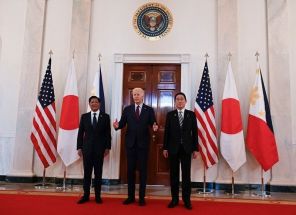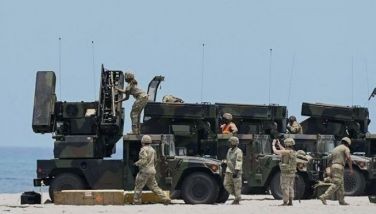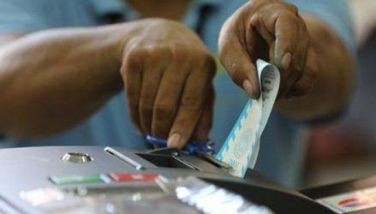Rights violations costing AFP
CHICAGO – Human rights violations are costing the Armed Forces of the Philippines (AFP) millions in aid from the United States, a human rights group said last week.
According to the Ecumenical Advocacy Network on the Philippines (EANP), the US Congress has expressed “serious concerns” in the lack of progress by the Philippine military on human rights.
This was among the reasons for the US Congress’ reluctance to approve the $1.1-trillion budget signed last Dec. 15 by President Barack Obama, which has an appropriation of $50 million in credits for the AFP to buy arms from the US, according to the EANP.
Since 2008, the AFP has lost over $13 million in funding after the US secretary of state concluded the AFP has not sufficiently improved its human rights record, the group said.
The North Carolina-based human rights group on Thursday said US Secretary of State John Kerry is prevented from releasing the $50 million unless he certifies that the AFP has met the requirements.
Citing the budget bill’s provisions, the EANP said the Philippine military can be given access to the funding only if it successfully prosecutes military personnel involved in human rights violations; implements a policy of promoting AFP personnel who demonstrate professionalism and respect for human rights, and takes steps to ensure that the troops and paramilitary groups under its control are not engaging in acts of intimidation or violence against journalists or human rights defenders.
The EANP recently sent a letter to the US Congress and the State Department documenting the lack of progress on human rights cases in the Philippines.
The group said the Philippine military has a dismal record of prosecuting human rights violators.
Since President Aquino assumed office in 2010, some 152 political and environmental activists have been killed and 18 disappeared, the group noted. There have been few arrests, only a handful of convictions, and not one mastermind has been convicted, the EANP added.
The group said the AFP continues to promote alleged human rights violators.
It cited the promotion of Brigadier Generals Eduardo Año, Aurelio Baladad, Ricardo Visaya and Lt. Gen. Jorge Segovia in 2013, who are facing accusations of involvement in human rights violations.
“Killings and abductions continue. Human rights groups in the Philippines have documented over 40 killings so far in 2014, a very significant increase compared to the previous year,” the group said.
“In addition to the killings, detentions, torture, disappearances, enforced dislocations of indigenous people, harassment and intimidation of human rights advocates, and suppression of labor rights are on the rise,” it added.
International human rights watchdog Human Rights Watch (HRW) also reported the reluctance of the US Congress to assist the Philippine military because of human rights violations.
“The Philippines’ verbal conflict with China heightened in 2013, with increasingly heated rhetoric from both sides over disputed territory in the South China Sea. As a result of China’s alleged incursions into territory claimed by the Philippines, the Aquino government turned for help to the United States, which promised to help finance modernization of the Philippines’ antiquated naval defense system. Several US senators sought to restrict military assistance to the Philippine army because of continuing rights violations and lack of accountability,” the HRW said in its World Report 2014.
Slain in the line of duty
In the same report, the HRW also cited the increasing number of Filipino journalists getting killed in the line of duty.
Citing local monitors, the HRW said 18 journalists have been killed since Aquino became president.
“While there has been a notable decline in extrajudicial killings under the Aquino administration, they remain a serious problem and rarely result in a prosecution,” HRW said.
The HRW also cited the slow pace in the Maguindanao massacre trial.
“Families of victims were increasingly impatient at the slow pace of the trial. Five years after the killings, the court is still hearing the bail petitions of several of the suspects. In August, five more suspects were arraigned, including the operator of the backhoe that was used to bury the victims. Of 197 identified suspects, 107 have been arrested, all but six of whom have been indicted,” it said.
HRW added the killings by “death squads” in Metro Manila, Davao City and Zamboanga City remain a serious problem.
“The victims are frequently petty criminals, drug dealers and street children. By all accounts these killings largely go uninvestigated and there are no reports of death squad members being prosecuted,” it said.
The human rights group also cited the human rights violations committed by militiamen controlled by the Philippine military.
“Alleged militia members working with the military murdered Benjie Planos, a tribal leader in Agusan del Sur province, on Sept. 13,” the HRW said.
Philip Alston, the UN Special Rapporteur on Extrajudicial, Summary or Arbitrary Executions, earlier said that while the Philippine government has taken some steps to address extrajudicial killings, it failed to implement needed reforms such as institutionalizing the principle of command responsibility.
Alston, in his report before the United Nations Human Rights Council, said the Philippine military has not changed its counterinsurgency methods to eliminate the likelihood of unlawful killings.
To address human rights violation involving military personnel, the AFP was placed under the monitoring of the Interagency Committee, which is led by the Department of Justice.
The AFP, for its part, launched the Internal Peace and Security Plan (IPSP) Bayanihan, a military plan of winning the hearts and minds of rebels in the mountains with the primary focus of winning the peace and not just defeating the enemies.
The AFP claimed allegations of human rights violations have been continuously declining since 2010, when President Aquino assumed power.
The AFP credited the decline of human rights violations to the implementation of the IPSP Bayanihan.
- Latest
- Trending





























